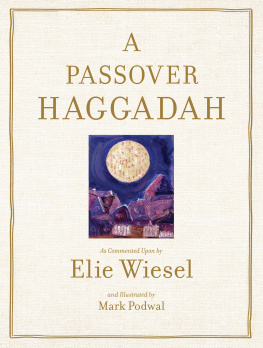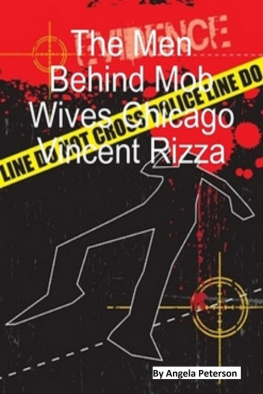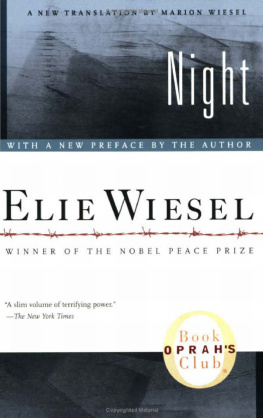ALSO BY ELIE WIESEL
A Mad Desire to Dance
The Time of the Uprooted
The Judges
Night
Dawn
The Accident
The Town Beyond the Wall
The Gates of the Forest
The Jews of Silence
Legends of Our Time
A Beggar in Jerusalem
One Generation After
Souls on Fire
The Oath
Ani Maamin (cantata)
Zalmen, or The Madness of God (play)
Messengers of God
A Jew Today
Four Hasidic Masters
The Trial of God (play)
The Testament
Five Biblical Portraits
Somewhere a Master
The Golem
(illustrated by Mark Podwal)
The Fifth Son
Against Silence
(edited by Irving Abrahamson)
Twilight
The Six Days of Destruction
(with Albert Friedlander)
A Journey into Faith
(conversations with John Cardinal OConnor)
From the Kingdom of Memory
Sages and Dreamers
The Forgotten
A Passover Haggadah
(illustrated by Mark Podwal)
All Rivers Run to the Sea
Memory in Two Voices
(with Franois Mitterrand)
King Solomon and
His Magic Ring
(illustrated by Mark Podwal)
And the Sea Is Never Full
Conversations with Elie Wiesel
(with Richard D. Heffner)
A NOTE ABOUT THE AUTHOR
Elie Wiesel was fifteen years old when he was deported to Auschwitz. He became a journalist and writer in Paris after the war, and since then has written more than fifty books, fiction and nonfiction, including his masterwork, Night, a major best seller when it was republished recently in a new translation. He has been awarded the United States Congressional Gold Medal, the Presidential Medal of Freedom, the rank of Grand-Croix in the French Legion of Honor, an honorary knighthood of the British Empire, and, in 1986, the Nobel Peace Prize. Since 1976, he has been the Andrew W. Mellon Professor in the Humanities at Boston University.
MUST ONE SUFFER and then feel deaths ice-cold breath on the nape of ones neck in order to understand why one has been going around since earliest childhood with an ill-defined despondency close to melancholy?
I felt it long before the trial.
And afterward.
I felt it on the day Dr. Feldman explained to me, in a gentle, slow voice, as though he were addressing a child, that the body can become our implacable enemy.
One day, I thought, Ill turn it into a novel.
Concerning the trial, I had long been convinced that Id never know the truth of what really happened that day between the two men, blood relations, in the high mountains of the Adirondacks.
Accident? Suicide? Murder? Can one willingly take to the grave an enigma that refuses to disclose its secret?
What evil spirit had driven Werner Sonderberg to take a break from his classes at New York University and leave town for a trip so far from the Village with the aged, disillusioned relative said to be his uncle? Yedidyah wondered. What could they have said to each other for their quarrel to reach a pitch of deadly violence? And who was this uncle whose tragic death, far from anyone, loomed over the Manhattan courtroom filled with journalists, lawyers, and curious onlookers for days and days?
The media, absorbed by ever-changing current events, or from boredom, no longer mention the trial. The fate of an individual matters little compared to the goings-on of political, financial, and artistic celebrities. But Yedidyah thinks about it often, too often probably; in fact, he remains haunted by it. Remembered images from the trial never leave him; and the proceedings echo in his mind. The lit-up room; the jury members, whose faces were alternately impassive and horrified; the judge, who at times looked like he was dozing but never missed a word of what was being said; the prosecutor, who thought he was the avenging angel. And the defendant, oscillating between defiance and remorse, avoiding the mournful gaze of his beautiful fiance. Sometimes, when Yedidyah assesses his work, with its setbacks and intervals of calm, his dazzling triumphs and slow or dizzying failures, this trial stands out for him like black granite attracting the twilight. Years have gone by, but Yedidyah still cant reach a verdict.
Where does a mans guilt begin and where does it end? What is definitive, irrevocable?
One thought has obsessed him constantly since then. Thanks to Dr. Feldmans diagnosis, he became conscious of his mortality: Could he possibly go, and duly leave his children, their mother, Alika, and the entire convulsive and condemned world, without certainty?
Until my final hour on this earth, Ill remember this event that bore me, carrying me from one discovery to another, from memory to memory, from emotion to emotion, and Ill never know the real reason behind it.
Why this meeting, this confrontation with a destiny that touched mine on the surface, like a coincidence?
I could have studied other subjects, been interested in music rather than theater; I could have had other teachers, been captivated by another woman and not fallen in love with Alika; I could have been less close to my grandfather and my uncle Mir; made other friends, cherished other ambitionsin short: I could have been born somewhere else, perhaps in the same country, the same city as Werner Sonderberg, and explored other memories. I could have lived my entire life without knowing the truth about my own origins.
I could simply have not existed, or ceased to exist. Or not been me.
I was in my office getting ready to write a review of a play that had just opened the Off Broadway season. It was Oedipus, an ultramodern, contemporary, hopeless (too chatty) interpretation of it.
On rereading the notes Id taken during the performance, I wondered about the plays endurance. How could it be explained? After all, of the three hundred plays written by the three giants of ancient GreeceAeschylus, Sophocles, and Euripidesall but around thirty have vanished. How could the selection and censorship of time be explained?
Do the gods, known and feared for their whims, have a say in this matter? Werent they themselves subjected to the same test? Some of the plays have become popular again while others seem consigned to the so-called dustbin of history: Is there any justice in this? And what about the collective memory of artistic creation? For every Prometheus and Sisyphus haunting scholars, how many of their former equals are barely stirring and covered in dust?
And then what could possibly have induced the producer to stage a doubtless costly show that should have remained in his head or in the drawer?
I mentioned my office a few paragraphs ago. A tiny, unused corner in the newsroom of a New York daily. A modest worktablea deskand two chairs rented by two European magazines for which I was culture correspondent in the United States. This was well before the invasion of computers. The place had all the characteristics that spring to mind when you think of a hellish environment, except that Dantes hell, with its nine circles, is surely more orderly. Unbearable racket, the incessant ringing of twenty telephones, impatient calls from the editors, the shouts of the photographers and messengers, the hot topic in the news: the arrogance of a politician, his rivals defeat, the inside story on an actresss love life, the confessions of an ideologically motivated killer, a scandal in fashionable circles or in the slums. One article is too long, the other not long enough. Headlines and subheadings compete for top billing. Two dates, two facts that cant be reconciled. A beginner is reprimanded; he breaks down in tears. An old-timer tries to console him. This, too, will pass; everything passes. In short, its not easy to concentrate. Not to mention my immediate preoccupation: my birthday.











